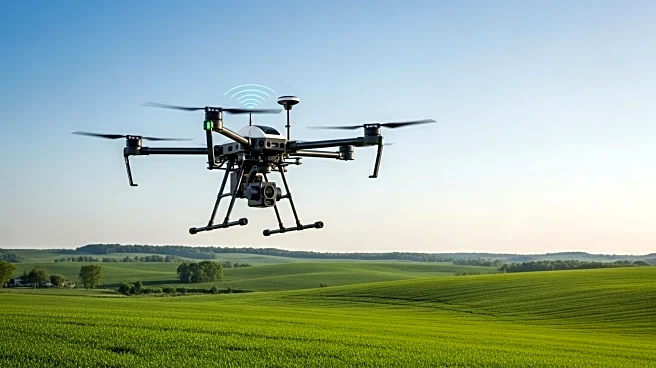What's Happening?
Iowa farmers are increasingly utilizing artificial intelligence (AI) to manage the vast amounts of data generated by modern precision agriculture techniques. This data includes variables such as soil type, row width, irrigation practices, and weather patterns, which can overwhelm farmers without actionable insights. At the Iowa Ideas conference, experts discussed how AI can provide these insights, helping farmers improve profitability, yield outcomes, and plant genomics. Baskar Ganapathysubramanian, a professor at Iowa State University, highlighted the role of AI in transforming agriculture through technologies like drones, satellite data, and sensors. AI models are being developed to predict agronomic traits in corn, potentially shortening the plant breeding cycle. Additionally, the InsectNet app, developed by Ganapathysubramanian's team, uses AI to identify over 2,500 insect species, aiding farmers in pest management.
Why It's Important?
The integration of AI in agriculture is significant as it addresses the challenges posed by the 'data deluge' in farming. By providing actionable insights, AI helps farmers make informed decisions, potentially increasing crop yields and profitability. This technological advancement is crucial for the agricultural sector, which faces pressure to produce more food sustainably amid changing climate conditions. AI's ability to streamline plant breeding processes can lead to faster development of crops that are more resilient and productive. Moreover, tools like InsectNet enhance pest management, reducing crop losses and improving environmental sustainability. The adoption of AI in agriculture could lead to more efficient farming practices, benefiting both farmers and consumers.
What's Next?
As AI technologies continue to evolve, their application in agriculture is expected to expand. Farmers may increasingly adopt AI-powered tools as trust and partnerships with organizations like the Iowa Soybean Association grow. The development of privacy-protecting methods like federated learning could encourage more farmers to share data, enhancing AI models' effectiveness. Continued collaboration between agronomists, engineers, and data scientists will likely lead to new AI applications in agriculture, further transforming the industry. Stakeholders will need to address data privacy and security concerns to facilitate wider adoption of AI technologies.
Beyond the Headlines
The use of AI in agriculture raises ethical and legal questions regarding data privacy and ownership. Farmers may be hesitant to share data due to concerns about how it will be used and who will have access. Establishing clear regulatory frameworks and building trust between farmers and technology providers are essential to overcoming these barriers. Additionally, the reliance on AI could shift traditional farming practices, requiring farmers to adapt to new technologies and methods. This transition may impact rural communities and the agricultural workforce, necessitating education and training programs to support farmers in leveraging AI effectively.










